Climate scientists are warning that rises in global temperatures will have catastrophic consequences for the planet. In a recent survey, 90 per cent of Premier Christianity readers agreed climate change should be a concern for the Church, but were divided over how pressing an issue it is. So should we prioritise the environment or evangelism? Three Christians share their views
Act now before it’s too late
Yesterday a big jar of chutney fell out of my overstuffed cupboard and smashed on the floor, sending shards of sticky glass across my kitchen. I left it – who cares about my old dog treading in it? No, of course, I didnt! I cleaned it up – just like you would have done. I could’ve stepped around it, blamed the cupboard or prayed it reassembled but, instead, I got on my hands and knees and wiped up the mess. So it is, in my mind, with the situation we collectively find ourselves in around climate and ecological collapse – it’s messy and hard and, darn it, it’s not even my fault (let’s blame someone else) – but I still have a choice to make in how I respond.
The first choice is to pay attention to the facts. I don’t always like doing this, but the chutney is well and truly out of the jar. Contemplating the mess is difficult; ignoring it is so much easier. We seem hardwired to turn away from suffering – on the Jericho road I’d have walked by on the other side, because bad things are scary and I’m not brave (Luke 10:25-37). Climate collapse makes for hard contemplation; too hot, too wet, too dry, too little food, too little done, too late and too slowly. I don’t want to drown or burn to death any more than you do.
The natural second choice is to lament. This is when the truth drops from heads to hearts, then to our hands and feet. Lament is biblical and beautiful; God can wake us up, turn us around and help us act. We must lament, repent and then crack on with clearing up our mess. Lament is not for the faint-hearted. It involves feeling the loss in our bodies of what God feels – the loss our actions have caused – our collective and individual greed; our fossil fuel addiction and selfishness; our refusal to stop wanting more and more stuff; our heresy that says: “It’s all about me.” Our refusal to love our neighbours, children and grandchildren as ourselves is clear when we won’t change so they can have a liveable future.
God’s beautiful planet is in deep trouble
The third choice follows: action. “And what does the Lord require of you?” asks Micah 3:8: “To act justly and to love mercy and to walk humbly with your God.” The mandate for nonviolent direct action is threaded through the whole love story of the Bible, culminating in the cross. As tempting as it is to pump up the volume on my AirPods and drown out the sound of those drowning, I’m called by God to more. We all must act on behalf of those who can’t; for newborns, the young, jaded, poor, sick, voiceless, starving and petrified. We are to stand up to governments and powers that go against God’s rule of love. We are told to follow in Christ’s footsteps, calling out religious piety that keeps the poor, poor, the rich, rich and the earth sick. We are to serve and live countercultural lives, as deeply resilient communities of faith that share the love and goodness of God – which includes uncomfortable calls to repentance and change.
Acting for climate stability and global flourishing is what we need to and must do. Christians should be out on the frontline. We’ve a lot of work to do and this is missional. The young are leaving our churches. Spending money on youth workers but not fighting for a planet that they can live on is ungodly hypocrisy. How can Christians say we believe in a God of love yet carry on business as usual, knowing that God’s animals, trees, rivers, insects, people and communities are suffering and dying because of our global and personal refusal to change how we travel, eat, invest and live? There is no such thing as good news without God’s news, which is that his beautiful planet is in deep trouble. We must tighten our belts and sort out the reasons behind our greed. We have a tiny window to be the Church that is needed right now.
So, let’s join the dots between climate collapse and mission and be the people that Jesus would recognise – those that sing and pray and act for climate justice – for the love of God, because time is almost out and the chutney is very much all over the floor.
Rachie Ross

Rachie is vice-chair of Operation Noah, a Christian charity working with the Church to inspire action on climate change. She is an active member of Christian Climate Action.
Follow her on Twitter @RossRachie
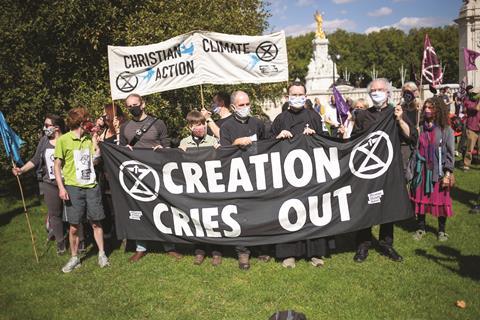
It’s complicated but God cares about our planet
I am the managing director of ATG Group in Northern Ireland, which offers planet friendly solutions to restore land that is contaminated or unstable. We are committed to reducing our carbon footprint and, over the last few years, we have saved our clients 14,444,000kg of carbon dioxide equivalent (CO2e) and recycled and re-engineered over 500,000 tonnes of soil.
When it comes to the climate crisis, there is a massive amount of campaigning and advocacy, but Christians should be discerning and ask: “Is what I’m hearing factual?”
As Christians, we are told to trust God and to be guided and transformed by the Holy Spirit’s leading. We also know that this planet is finite and has an end point (see 2 Peter 3:7). After that, God will restore the earth and it will last forever (Isaiah 65:17).
Not everything that is said about the climate crisis is accurate. For example, I don’t believe that carbon dioxide (CO2) is the big bad wolf. I fear that targeting a reduction in CO2 could unwittingly cause more trouble than good. We need to wise up to the true cost of using biofuels in order to reduce our CO2 consumption. Deforestation is occurring at a rapid rate in order to grow more crops to produce bio-oils and other biofuels such as ethanol. This is harming the planet, not healing it.
To take another example, do electric cars really result in carbon reduction once you factor in the cost of producing them? Electric vehicles are powered by batteries that contain cobalt, lithium or other rare earth metals. These all carry very high environmental and social costs of their own. An electric car typically contains far more copper than a conventional one. The process for producing this not only requires massive amounts of electricity but results in large amounts of pollutants (lead, uranium, sulphur etc) that must be disposed of.
Christians should ask: “Is what I’m hearing factual?”
What’s more, according to International Synergy, we will run out of some of the raw materials needed to make electric cars by 2050. It is feared that global reserves of metals will not be enough to support electrification of transport. If we do run out, everything we make will need to be recyclable and part of the circular economy.
Christians are given a clear biblical instruction in Genesis to look after the earth. The Christian charity I founded, Ashes To Gold, helps to do this by making the grounds we own productive again. Our Grow project is designed to help people in the community, who may be long-term unemployed or have additional needs, to get physically active and grow their own food in a sociable and supportive environment. We have two acres of land producing food and fruit. All of this is sustainable – and also provides amazing opportunities for evangelism.
The word ‘land’ is mentioned more than 1,000 times in scripture, and God says: “Those who work their land will have abundant food” (Proverbs 12:11). There is a real connection between humankind and the land, working together, which is God ordained.
Humans were created by God with the intent of abundant living. In order for that to happen, we must take care of the earth, and one another.
Dr Mark McKinney
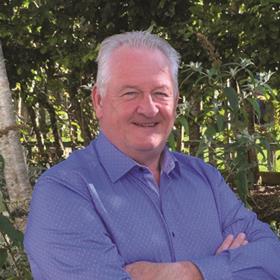
Mark is the founder of ATG Group in Northern Ireland. With over 30 years of experience and a PhD in microbiology, he is a leading authority on site remediation techniques and the restoration of contaminated land.
Find out more at atg.group
Don’t worry just focus on the gospel
“What would Jesus do?” might seem too trite a question, but it’s not a bad place to start a theological enquiry.
Time and again, Jesus sidestepped being drawn into direct political action. The most famous example was when he was shown a coin used for taxation. Taxation imposed a terrible burden on the Jews and was deeply resented. If resistance to the colonialists was to begin anywhere, it might begin with refusing the burden of taxation. But Jesus replied: “So give back to Caesar what is Caesar’s, and to God what is God’s” (Matthew 22:21).
This distinction between what is Caesar’s and what is God’s has proved to be one of the greatest challenges in the Church’s history. And one of the places it expresses itself most directly is in the dilemma over whether to prioritise social action – or in this case environmental action – over evangelism.
There is some doubt about the future of the weather. But there is no doubt about the coming judgement and the danger of hell
We should approach the threatening climate crisis by asking hard questions of the science. There remain questions to be answered about the reliability of the complex computer models on which the apocalyptic scenarios we are threatened with are based. In setting out our priorities, we might argue that, for the faithful Christian, there is some doubt about the future of the weather, potential plagues and pandemics which might rebalance our polluting output, and ecological crisis. However, there is no doubt about the coming future judgement and the reality of the offer of heaven and the danger of hell.
Jesus never taught that the political situation or the state of the social environment was a factor that needed to be take into consideration when he commanded his disciples to take the good news to the ends of the earth and the end of time. The offer of salvation and accompanying transformation on the journey into holiness took first place for him. And so it should for us.
There is also a pragmatic case for the Church putting evangelism at the top of our hierarchy of aims and values.
The best way of enabling people to behave with altruistic wisdom and responsibility is to convert them to Christianity. Then they are moved from self-interest to the practice of love for their neighbour. The best way of creating an unselfish community willing to make sacrifices for the common good is to make Christians of them.
In our own history, it was the powerful influence of evangelical Christians who played a central role in achieving the abolition of slavery against all the weight of economic self-interest. One of the morals of that story is that the more Christian a society is, the more likely it is to act ethically, generously and unselfishly. The more effectively it can then overcome a crisis rooted in the dysfunctional and dangerous human condition. As Jesus said: “But seek first the kingdom of God and his righteousness, and all these things will be added to you” (Matthew 6:33, ESV).
Gavin Ashenden
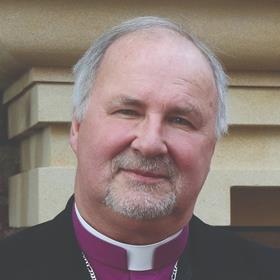
Gavin is a Roman Catholic author, commentator and columnist. He is associate editor of the Catholic Herald and hosts the podcast ‘Merely Catholic’, as well as two youtube channels ‘Ashenden Scripted’ and ‘Catholic Unscripted’.
Follow him on Twitter @gavinashenden


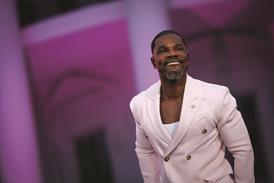










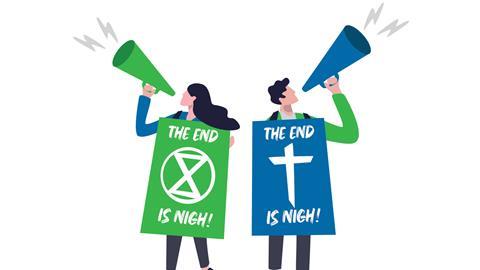





















No comments yet